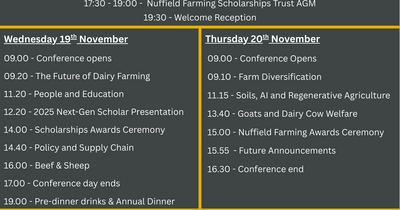
Heidi Hall NSch 2019, Global Technical Services Manager at Anpario, has published her Nuffield Farming report titled ‘The Power of the Microbiome to Produce Happy, Healthy Pigs’, sponsored by The John Oldacre Foundation.
“With the ever-increasing pressure to reduce antimicrobials and the looming crisis of antimicrobial resistance, pig producers must review their unit in a holistic manner with gut health at its centre,” Heidi explains. “Harnessing the power of the microbiome, the population of bacteria which reside in the gut, is the key to sustainable pig production.”
Heidi looked at how the industry can produce pork and manage herds with minimal requirement for antibiotics to reduce the risk of antimicrobial resistance (AMR). She examines the macro factors which affect gut health and the microbiome such as management, genetics, health, and nutrition.
“Stress is what links all factors and minimising the level of stress the animal is under is the key to reducing gut inflammation, unnecessary medication use and reducing AMR,” says Heidi. “We need to routinely measure microbiome changes alongside stress levels in animals, prior to and during research trials, so that we can better understand any performance changes seen.
“We should be targeting medication reduction in the breeding herd, which will be achievable through improving immunity, vaccination protocols and a focus on gut health and by doing so we should see improvements in the performance of their progeny through maternal transfer.
“We need to further understand the influence we have on gut health (and it on performance) through effective monitoring on farm and in trials. We can then look to manipulate gut health to favour a microbiome which is best suited to the production system through management of the sow microbiome,” she concludes.
Heidi was one of the first Scholars to have her report accredited by the Institute of Biology, Environmental and Rural Sciences (IBERS), part of Aberystwyth University.
The report is now available on the Nuffield Farming website at www.nuffieldscholar.org/reports or can be downloaded directly at bit.ly/3pzUTIf.
Heidi also presented her findings during the recent Nuffield Farming Virtual Mini-Conference Series. Her presentation can be seen on Nuffield Farming’s YouTube channel at bit.ly/3iok3b6.
Study Objectives
- To understand each of the factors affecting gut health and the link this has with animal performance, including veterinary interaction, nutrition, genetics, animal husbandry and management on the unit.
- To understand the relationships between these co-factors and what people believed were the most important.
Countries Visited
America, Canada, Denmark, Hungary, Portugal and Vienna as well as visits in the UK and information gained from South Korea and China following travels there in November 2018 and Jan 2019.
Messages
- We need to have a holistic view and approach to raising animals for food.
- All factors influence gut health and therefore animal performance to a varying degree and the priority or order of their importance can be different depending upon the site or simply the viewpoint of those involved.
- Gut health is affected by all interacting forces on the animal through stress and this is central to managing animals; to ensure good productivity, health and welfare.
- The sow should be our focus for intervention as she directly and indirectly affects the progeny health and performance.



